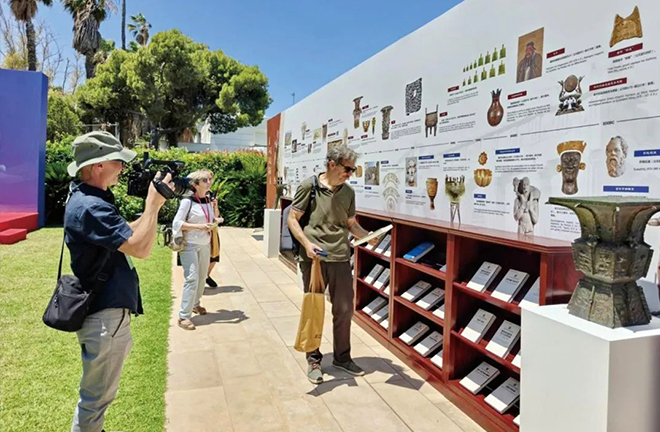Academics explore pathways to inter-civilizational exchanges

International scholars at an exhibition and book showcase on mutual learning among civilizations prior to the seminar Photo: PROVIDED TO CSST
ATHENS, GREECE—On June 26, a seminar titled “Opening the Gate of Mutual Learning Among Civilizations” convened at the new premises of the Chinese School of Classical Studies at Athens under the Chinese Academy of Social Sciences (CASS), in Athens, Greece. Scholars from China and Greece gathered to explore the deep connections between Chinese and Western civilizations and discuss new directions for contemporary cultural exchanges.
In his speech, Zhang Zhiqiang, director of the Institute of Philosophy at CASS, elaborated on the core philosophical concept “transcendence.” He argued that while different civilizations have developed distinct interpretations of transcendence, Chinese philosophy understands it as a generative practice unfolding “at the boundary of being and non-being”—a historical transcendence that “bridges past and present to explore the unity of heaven and humanity.”
Zhang emphasized that the Confucian framework of generation, the Daoist principle of form-taking, and the Buddhist unity of the imagined, dependent, and consummated natures collectively constitute the unique tradition of historical metaphysics in Chinese civilization, reflecting a critical spirit of continuous creation within reality. His remarks offered a profound philosophical lens for interpreting Chinese classical thought and set the theoretical tone for the seminar’s multi-civilizational dialogue.
Liu Jian, deputy director of the Institute of Foreign Literature at CASS, highlighted the pivotal role of language and writing systems in inter-civilizational exchanges. She noted that as fundamental carriers of human civilization, languages and scripts demonstrate complex and multifaceted mechanisms of interaction and integration during the early Silk Road period.
By mapping the transmission of major ancient scripts across the Eastern Mediterranean, West Asia, South Asia, Central Asia, and East Asia, Liu revealed the multiple roles played by writing systems—facilitating military expansion, enabling religious transmission, and mediating cultural interaction. This mutual influence among scripts not only deepened cross-civilizational understanding but also created a profound dynamic of interdependence. Such historical patterns, she argued, provide invaluable insights for contemporary linguistic and civilizational dialogue.
Sun Yabing, a research fellow from the Institute of Ancient History at CASS, delved into the significance of oracle bone script as the origins of Chinese characters. Dating back 3,200 years, this mature writing system—etched onto tortoise shells and animal bones—comprises over 4,000 distinct characters. Understanding oracle bone script, Sun explained, not only sheds light on the etymological roots of Chinese characters but also on the broader developmental trajectory of early Chinese civilization.
Hu Yujuan, a research fellow from the Institute of World History at CASS, examined classical concepts of “good governance” and “happiness” through the lenses of Greek and Roman philosophy. She explored how three key thinkers—Plato, Cicero, and Marcus Aurelius—articulated differing ideals: Plato advocated for rule by philosopher-kings, Cicero emphasized civic virtue and public duty, and Marcus Aurelius promoted rational self-cultivation and living in harmony with nature. For Hu, this millennia-spanning philosophical dialogue reflects both a shared concern for human flourishing in the classical world and the diverse paths taken by civilizations in approaching political and ethical issues.
Chen Jun, a research fellow from the Institute of Literature at CASS, reviewed the development of Sanskrit studies in modern China. He noted that figures like Zhang Taiyan and Su Manshu pioneered the field during the late Qing Dynasty (1644–1911) by studying Sanskrit and compiling grammar manuals, laying the foundation for research in modern times. Later, scholars including Chen Yinque, Hu Shi, Tang Yongtong, and Ji Xianlin applied Sanskrit philology to the study of ancient Chinese literature and history, catalyzing the formation and growth of related disciplines. According to Chen, this intellectual journey underscores the critical role of open cultural perspectives, linguistic proficiency, and sustained international exchanges in advancing scholarship.
The seminar not only showcased the rich achievements of comparative civilizational research between Chinese and Hellenic academia but also established new pathways for exchanges between Eastern and Western classical studies.
Edited by CHEN MIRONG
